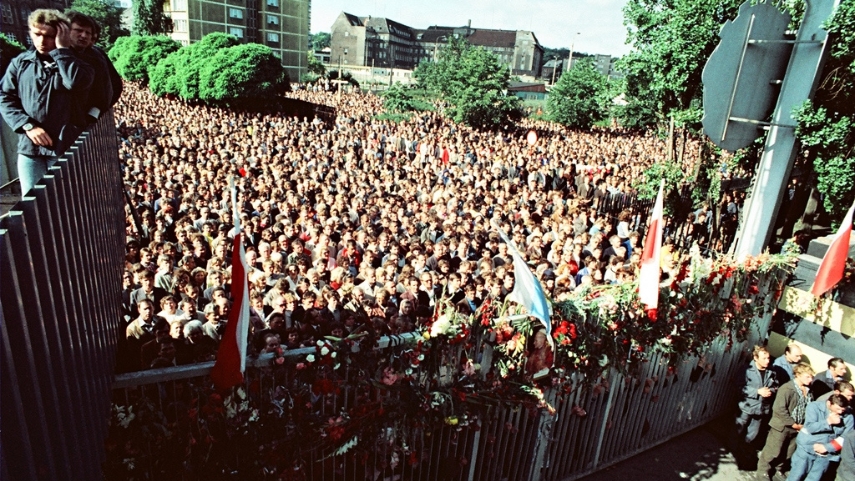
45 years of the Solidarity
/ call for papers
After 45 years, we are returning to the striking Lenin Shipyard in Gdansk. We want to look at the events, reflect the atmosphere, explain the contexts, but also examine how the great victory of Solidarity has survived in our memory, how it is interpreted and commemorated, and finally, whether it is still alive and finding imitators. We invite you to the ECS for a three-day academic conference on August 28-31, and we are waiting for applications.
In August 1980, as a result of the strike at the Lenin Shipyard in Gdansk, the communist authorities signed the Gdansk Agreement with the protesting shipyard workers, legalizing Solidarity – the first trade union organization in communist countries, independent of the authorities. This was a real breach in the wall separating Central and Eastern Europe from the rest of the world. The striking shipyard workers accomplished the almost impossible – the rulers of People’s Poland, giving in to the mass protests in Poland, agreed to register a trade union independent of the authorities. One of the unique aspects of these demonstrations was the support of almost the entire society.
During the conference, we want to delve into the details of these events from today’s perspective, but also to convey the atmosphere of the time and place, and explain the contexts of the events. We also want to see how the great victory of Solidarity has survived in our memory until today, how it is interpreted and how it is commemorated. We also want to look at whether the idea of solidarity is still alive in today’s societies, whether there are movements around us that refer to the idea of solidarity and the legacy of Solidarity.
During the celebration of the 45th anniversary of the signing of the August Agreements, we will look closely at the reasons that led to the creation of Solidarity, the support it received from the Church, artists or other social groups. Witnesses of history will tell us what challenges they faced, why they chose a trade union as a form of organizing resistance to the authorities. We will also ask them about the global causes of the uprising and its impact on other countries of people’s democracies.
The Solidarity Trade Union has become a political, social and cultural phenomenon. The union’s activities have been and continue to be analyzed and interpreted by scholars around the world, who not only pay attention to various aspects of Solidarity, but offer their interpretations. We want to focus on the diversity of these analyses and the ways in which Solidarity is memorialized today in museums, books and other forms.
Solidarity was driven by the sense of injustice experienced by workers in Poland, as well as a sense of responsibility for others, according to the motto of Pope John Paul II, “To look into the eyes of another and see in them the hopes and anxieties of a brother or sister – is to discover the meaning of solidarity.” In 2025, these words are as relevant as they were in the hot summer of 1980. What is the meaning of solidarity today? What forms does interpersonal solidarity take, what problems does it address? We will discuss these questions among sociologists, political scientists, philosophers and other scholars, as well as witnesses of history.
We plan to publish a post-conference publication.
Registration link: https://forms.office.com/e/9V4DpkjP4B
We are waiting for your submissions until the end of April, notifications will be sent out in early May, the event will take place on August 28-31 2025 at the European Solidarity Centre in Gdańsk, Poland.
We are waiting for submissions for our conference, of the topics to be covered, but are not limited to, are:
/ Solidarity and its interpretations
/ Commemorating Solidarity
/ Solidarity in art
/ International solidarity
/ Contemporary examples of solidarity in social movements
/ Trade unions today, is labor solidarity possible
/ Examples from other countries like Czechoslovakia, Hungary, Ukraine, the Baltic States
/ Geopolitical reasons and consequences of August ’80
Querries and questions
dr Grzegorz Piotrowski
/ tel.: +48 517 368 064
/ mail: g.piotrowski@ecs.gda.pl